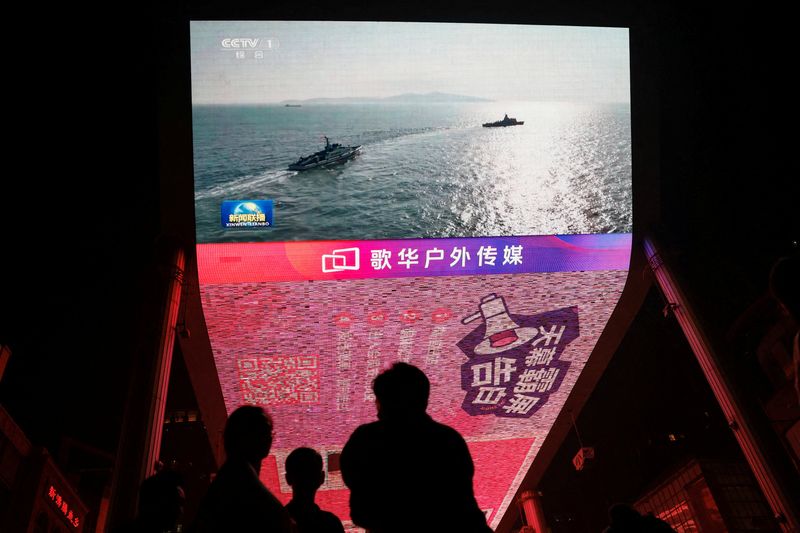
Written by Idris Ali and Phil Stewart
WASHINGTON (Reuters) – Corruption in China's military may have hindered its progress toward 2027 military modernization goals, the Pentagon said in its annual report on China's military released on Wednesday.
Since last year, the Chinese army has been witnessing a large-scale anti-corruption purge, and the Ministry of Defense said last month that a senior military official had been suspended and was under investigation for “serious violations of discipline.”
Between July and December 2023, at least 15 high-ranking Chinese military officers and defense industry executives were removed from their posts, the wide-ranging Pentagon report said.
“In 2023, the PLA saw a new wave of corruption investigations and dismissals of senior commanders, which may have stalled its progress toward its stated 2027 modernization goals,” the report said.
US officials, including the head of the CIA, said Chinese President Xi Jinping had ordered his military to prepare to invade Taiwan by 2027.
The Pentagon said China's official modernization goals for 2027 include accelerating the integration of intelligence, mechanization and other tools while enhancing the speed of modernization in military theories, personnel, weapons and equipment.
Eli Ratner, US Assistant Secretary of Defense for Indo-Pacific Security Affairs, told a think tank in Washington after the report was published that the removal of the 15 senior officials was likely “the tip of the iceberg.” He added that the Chinese leadership would not take such tough anti-corruption measures unless it felt that the operational effectiveness of the People's Liberation Army had been affected.
“I don't think it's just… some guys take some money and put it in their pockets, or maybe feast, and buy expensive whiskey,” Ratner said at the Center for Strategic and International Studies.
He added that the campaign was likely to create a period of risk aversion and “paralysis” in the lower ranks.
A senior US Defense Department official told reporters that the anti-corruption campaign could also slow down military projects, including China's defense industry.
“Once corruption is discovered in one place or a senior official is involved, there is a kind of spiraling effect (that) seems to inevitably attract additional officials,” said the official, who spoke on condition of anonymity.
The report noted several removals from China's military missile force, known as the People's Liberation Army Rocket Force (PLARF), an elite arm of the People's Liberation Army that oversees its most advanced conventional and nuclear missiles.
“The impact on PRC leaders' confidence in the PLA following the discovery of corruption on this scale may be high due to the PLA's uniquely important nuclear mission,” she added.
In November, China said Admiral Miao Hua, who served on the Central Military Commission, the country's highest military command body, was being investigated for “serious violations of discipline.” Miao was the military's senior political official on the six-person committee, which Xi chairs.
Beijing said media reports that Defense Minister Dong Jun, who ranks below Miao, had been sidelined due to the investigation, were “pure slander.”
“The PLA has made mixed progress toward achieving its modernization capabilities by 2027, which, if achieved, could make the PLA a more credible military instrument for the Chinese Communist Party’s Taiwan unification efforts,” a document accompanying the Pentagon report said. Communist Party.
A poll by Taiwan's largest military think tank published in October showed that most Taiwanese believe China is unlikely to invade in the next five years but see Beijing as a serious threat to the democratic island.
Over the past five years or so, the Chinese military has dramatically intensified its activities around Taiwan, which Beijing considers its territory, despite strong objections from the government in Taipei, and has never renounced the use of force to bring the island under its rule. Its control.
Despite efforts to modernize, it is not clear that the PLA is moving closer to its Taiwan-related goals given US moves to keep up the pace and build deterrence in the Indo-Pacific region, Ratner said.
“They may be rushing forward with military modernization, but they find themselves just as far away, if not further away, from solving some of the operational problems they are trying to solve,” he added.

In response to the report on Thursday, Taiwanese Defense Minister Wellington Koo said the military will continue to adjust its plans and strengthen itself so that China does not engage in a large-scale invasion.
“We will use our strength to deter any possible reckless actions in the Taiwan Strait,” he told reporters in Taipei.







